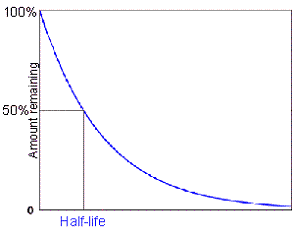


The term which is used for the time required for the amount of a particular substance to be reduced to one half of its value when the rate of decay is exponential.
Radioactive half-life refers to the decay of radioactive substances. Iodine-131, for instance, has a half-life of 8 days whereas that of Plutonium-239 is more than 23 000 years.
Biological half-life refers to decay by biological processes. Substances with a long biological half-life will tend to accumulate in the body and are, therefore, particularly to be avoided. Substances with a short biological half-life may accumulate if some becomes tightly bound, even if most is cleared from the body rapidly. There is also the possibility of cumulative effects of chemicals which have a short residence time in the body.
Source: GreenFacts

Source: GreenFacts
Français: Demi-vie biologique